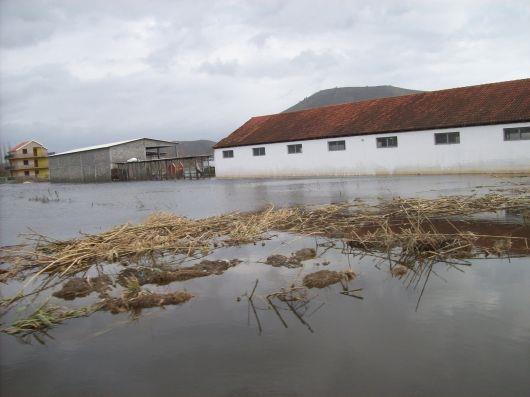Albanian agriculture getting back on track after heavy rains and flooding

In just three days, Albania received 200 millimeters of rain that damaged thousands of hectares of farmland, along with greenhouses and other agricultural infrastructure. That was in February 2015. Two years later, things are looking up for Albanian agriculture.
The hardest-hit regions were in the country’s south and southeast. In the regions of Vlora, Fier, Lushnja, Berat, Korca and Gjirokastra, some 10,000 hectares of farmland were damaged. Food crops, forage crops, and greenhouses for early production of vegetables and fruit were damaged or destroyed.
The livestock sub-sector was damaged to a lesser extent, although the lack of feed in the months that followed would negatively affect animal production.
The European Union, in cooperation with the Ministry of Agriculture, drafted a programme of recovery that went beyond simple restoration of pre-flood conditions and aimed to increase resilience to future natural disasters – with infrastructure, institutional and social implications.
Today, the project “Recovery of agricultural damages and the return of productive capacity” has entered a new phase. It aims to increase the ability of farmers and rural communities to respond to such disasters. It is also expected to strengthen agricultural extension services and other institutions, such as the Center for Transfer of Agricultural Technologies, municipal-level services, the Agricultural University, and nongovernmental organizations that provide services to farmers or who are willing to invest in local economic development.
FAO, in collaboration with Albania’s Ministry of Agriculture, is providing a training programme in six affected regions: Vlorë, Fier, Lushnjë, Berat, Korçë and Gjirokastër. Training covers topics such as “Natural hazards and climate change in Albania,” “Impact of climate change on agriculture,” “Good agricultural practices to reduce the risk of damage,” and “Impact of climate change on integrated pest management and food security.”
The training programme started in the most damaged areas of Fier – Darzezë, Povelçë and Hekal, followed by Berat, Korça, Fier and Vlora. Farmers demonstrated keen interest in applying new practices designed to withstand adverse weather conditions and increase production capacity.
Participants in the recently concluded training programmes included Ministry staff, representatives of the National Food Authority, the Center for Transfer of Agricultural Technologies, the Albanian Rural Development Agency, local government emergency units, the Agriculture University of Tirana, and nongovernmental organizations.
In total 727 farmers, 137 extensionists and specialists from other institutions received training. Participants said they appreciated the training, and considered it essential both for farming and for drafting new protocols for Integrated Pest Management and coping with climate change.
13 April 2017, Tirana, Albania
